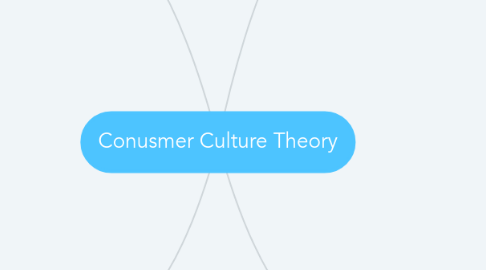
1. Meaning
1.1. CCT refers to a family of theoretical perspectives that address the dynamic relationships between consumer actions, the marketplace, and cultural meanings
1.2. CCT explore how consumers actively rework and transform symbolic meanings encoded in advertisements, brands, retail settings, or material goods to manifest their particular personal and social circumstances and further their identity and lifestyle goals
2. 4Ps Framework
2.1. Consumer Identity Projects.
2.1.1. Consumer culture theory concerns the , coproductive ways in which consumers, working with marketer-generated materials, forge a coherent if diversified and often fragmented sense of self
2.2. Marketplace Cultures.
2.2.1. CCT research also addresses the ways in which consumers forge feelings of social solidarity and create distinctive, fragmentary, self-selected, and sometimes transient cultural worlds through the pursuit of common consumption interests
2.3. The Sociohistoric Patterning of Consumption.
2.3.1. CCT addresses is the institutional and social structures that systematically influence consumption, such as class, community, ethnicity, and gender. Consumers are conceived of as enactors of social roles and positions
2.4. Mass-Mediated Marketplace Ideologies and Consumers ' Interpretive Strategies.
2.4.1. CCTy examines consumer ideology—systems of meaning that tend to channel and reproduce consumers' thoughts and actions in such a way as to defend dominate interests in society
3. Misunderstandings
3.1. 1)
3.1.1. CCT study particular contexts as ends in themselves.
3.1.1.1. However
3.1.1.1.1. CCT do not study consumption contexts; they study in consumption contexts to generate new constructs and theoretical insights and to extend existing theoretical formulations.
3.2. 2)
3.2.1. Differences between CCT and other traditions of consumer research are methodological.
3.2.1.1. However
3.2.1.1.1. CCT researchers embrace methodological pluralism whenever quantitative measures and analytic techniques can advance the operative theoretical agenda.
3.3. 3)
3.3.1. Consumer researchers most typically defined managerial relevance in terms of a rational choice paradigm and its corresponding focus on purchase behavior.
3.3.1.1. However
3.3.1.1.1. It is possible to argue that an understanding of consumer symbolism and lifestyle orientations is essential to successful marketing strategies
